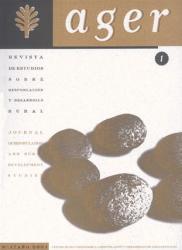Spanish mountain in capitalist developement, 1860-1991: secure peripheralization, conditional spread
Abstract
The purpose of this article is to undertake a comparative analysis of the demographic evolution of Spanish mountain areas and county towns for the 1860-1991 period. On the basis of these empirical results, it is discussed the applicability of the argument according to which spatial polarization is mitigated by spread effects that favour the development of the backward areas. The main conclusion is that, although the peripheralization of the mountain is secure, spread effects arrive only on condition that some technological, institutional, ecological and demographic requisites are fulfilled. Therefore it is propounded a broader theoretical frame (belonging to evolutionary political economy) for the study of the diverse historical paths followed by peripheries. Finally, it is presented a preliminary application of this approach to Spanish mountain for the mentioned period.Downloads
Published
How to Cite
Issue
Section
License
Authors who publish in this journal agree to the following terms:
a. Authors retain their copyright and grant the journal the right of first publication of their work, which will be simultaneously subject to the Creative Commons Attribution Licence, which allows third parties to share the work provided that the author and the journal's first publication are acknowledged.
b. Authors may enter into other non-exclusive licensing agreements for the distribution of the published version of the work (e.g., depositing it in an institutional repository or publishing it in a monographic volume) provided that the initial publication in this journal is acknowledged.
c. Authors are permitted and encouraged to disseminate their work via the Internet (e.g. in institutional digital archives or on their website), which may lead to interesting exchanges and increase citations of the published work. (See The effect of open access).

